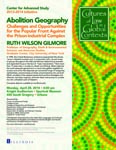Abolition Geography: Challenges and Opportunities for the Popular Front Against the Prison-Industrial Complex
Knight Auditorium, Spurlock Museum 600 South Gregory Urbana
A number of trends illuminate the proactive and reactive social-spatial dynamics that shape the carceral geographies that have arisen unevenly as the earth’s surface has become increasingly ensnared by globalizing capital. Not surprisingly, the trends coalesce around categories: policing, immigration, terrorism, public expenditure/the social wage, civil injunctions, sexuality, gender, age, premature death, parenthood, housing, public education, privatization, formerly and currently incarcerated people, public sector unions, devalued labor, and (relative) innocence. Racism both connects and differentiates how these categories rise to prominence in both radical and reformist policy prescriptions, and invites renewed energy in understanding and enacting how ordinary people –- to use Peter Linebaugh’s exquisite phrase --“pierce the future for hope.” Insofar as policies are a script for the future, they must indeed be sharp, a quality often confused with excessive narrowness.
And yet, breadth carries analytical challenges as well. It’s not news that we find the answers to the questions we ask. What then would the most adequate general term or terms be that gather together for scrutiny and action such a disparate yet connected range of categories, relationships, and processes as those concentrated by the carceral? Nearly 15 years after the 1998 Critical Resistance conference popularized the phrase “prison industrial complex”–and in conjunction with a broad range of groups throughout the USA and abroad helped bring renewed and expanded focus on the fact of “mass incarceration”–it is wise to refresh our thinking. What’s at stake is how people pursue both political strategies and alliances, how they organize, promote ideas, and pursue to completion the unfinished work of freedom, which is one of modernity’s central contradictions.
Professor, Earth & Environmental Sciences, and American Studies Director, Center for Place, Culture, and Politics Graduate Center, City University of New York

